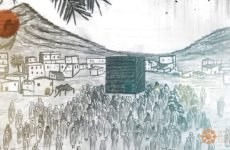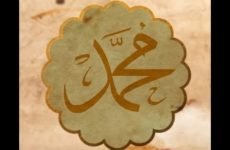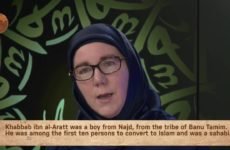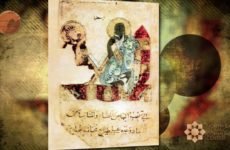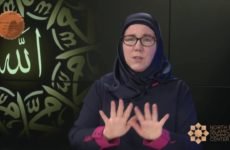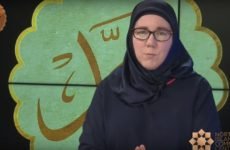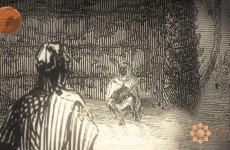As salaam alaikum wa rahmatullahi wa barakatuh
May the peace, blessings, and mercy of God be upon you.
In our last video, we shared the story of the first revelation brought down by the Arch Angel Gabriel (Jabreel) to the Prophet Muhammad, sallallahu alayhi wasallam. This event marked the beginning of a new chapter in the life of Rasul Allah, the chapter of Prophethood and Revelation.
So what we are going to talk about in this video is the very beginnings of the spreading of the message and how the first followers came to Islam.
After this momentous event of receiving the revelation, the heavens were silent. The Prophet anxiously awaited his next steps and eagerly hoped for his next encounter. His wife Khadijah had become the first one to make the declaration of faith and become a Muslim. Forty days had passed since the blessed meeting at the Cave of Hira. After waiting for this moment for forty years, Prophet Muhammad was alone and longing for the life-giving breath of Gabriel. And then finally his wait was over; he heard the Truthful Gabriel’s voice in the heavens, “I am Jabreel.” The Messenger of Allah turned towards where the voice was coming from and lifted his head. He saw Gabriel on a platform between the heavens and the earth, and he was saying, “O Muhammad! You are the true Messenger of Allah.” (p. 114) After those forty days of waiting with longing, the revelations began to pour down like rain, and before long, the Truthful Gabriel came and taught the Messenger of Allah ablution and the prayers. At this meeting, Gabriel scratched the ground with his feet. A spring came forth from the spot, and Gabriel showed Rasul Allah how to take ablution, and then how to pray. When he returned home, the Messenger of Allah taught the ablution and the Prayers to our mother Khadija. (p. 123)
‘Little Ali was around the Prophet during these times, and he observed this prayer. When Prophet Muhammad and Khadijah finished, he asked, “What is that you’re doing?”
“I am praying to the Lord of the worlds.”
“Who is the Lord of the worlds?” asked Ali. Prophet Muhammad answered him in the best manner, and that night Ali thought long and hard about all he had heard. In the morning, ten-year-old Ali came to the Prophet and made his declaration of faith. Next came Zayd ibn Haritha, another inhabitant of the home of the noble Prophet. He could sense that something was happening but he could not tell what it was exactly. He watched with astonishment as he saw the Messenger of Allah and our mother Khadija performing the prayers. After they finished, Zayd, like Ali, asked what they were doing. And like Ali, the answers given by the Pride of Humanity resonated deep in his heart and right then and there, he attested to Allah’s uniqueness and joined the train of believers after Khadija and Ali. (p. 127)
During these events, Abu Baker had gone to Yemen for trade and after a long journey, he returned to Mecca. In the Mecca of that time, Abu Bakr was a rich man of high standing whom the Meccans would turn to for advice about inheritance and blood money. On his return home, when he approached Mecca, the leading men of Quraysh were waiting for him. It was clear that developments had taken place in Mecca, and so he asked in alarm: “What happened here in my absence? Is there some news?”
“News indeed, O Abu Bakr! The orphan of Abu Talib thinks he is a Messenger. Had it not been for you, we would not have waited and seen to it already. But now you are here, you will deal with the situation.” While the Quraysh were thinking that Abu Bakr would put an end to this Messengership, Abu Bakr did not let on that he was thinking quite differently; he sent them away sweetly without alarming them. Abu Bakr had different intentions, for you see on his trip to Yemen, he had an interesting conversation with the old man of Azd. Upon entering Yemen, the old man of Azd visited with him and asked him many questions. He spoke to Abu Bakr about the Last Messenger who would appear in the Haram and also about the first people who would stand with him. On getting to know Abu Bakr better, he said without hesitation, “I swear by the Lord of the Ka’ba that you are one of the first ones,” thus giving him the good news that Abu Bakr would be a loyal companion of the awaited Messenger. Azd had written poems about the awaited Messenger, and he recited them and gave them to Abu Bakr. Abu Bakr replayed these events in his mind and headed straight to Khadija’s house and knocked on her door. Prophet Muhammad answered. Abu Bakr was bursting with curiosity, but he held fast in order to be sure. He asked, “O Muhammad! Have you left the traditions of your family and religion of your ancestors?” Prophet Muhammad confirmed this, and Abu Bakr asked, “What is your proof in this matter?” The Beloved answered, “The old man you met in Yemen.” Wanting to be sure, Abu Bakr replied said, “I met many old men in Yemen!” This was his way of asking, “Which old man do you mean?” The Prophet replied, “The old man who gave you the verses.” (p. 128-129)
There was no way that Prophet Muhammad could have known this. Abu Bakr was astonished with this response. He could think of nothing else to say except, “Who gave you this news, O Beloved?” The answer came, “The great angel who came to those before me as well.” There was only one thing left for Abu Bakr to do. He stretched out his hands and said, “Give me your hands, I will swear allegiance to you,” he said most sincerely, and then with a voice full of compassion he declared the light in his heart, “I bear witness that here is no deity but Allah and without a doubt you are His Messenger.” (p. 130)
This news spread quickly and caused shock ripples throughout Mecca. How could it be! The person that they depended on to solve the problem had changed sides. After a couple of days, Zubayr ibn Awwam, a young boy of 15 and a cousin of the Prophet Muhammad came and did likewise.
During these first years, the invitations to join Islam were carried out secretly. People like Abu Bakr used their standing in society to introduce their old friends to the Great Messenger. Abu Bakr introduced Uthman ibn Affan and Talha ibn Ubaydullah to Prophet Muhammad. Uthman and Talha entered into the Prophet’s presence and seeing his beauty reminiscent of a rose, they melted like candles, and they were enraptured. These blessed gatherings played out time and time again. Like Abu Baker, Talha had heard from outsiders about the coming Messenger. This happened at a fair at Basra when glad tidings were given to him by the priest who advised him to believe in him and to be on his side.” (p. 136-137)
Others came to the Prophet because of their dreams. Sa’d ibn Abi Waqqas had dreamt that he was in a pitch-black night. Then a full moon rose. A path of light appeared and Sa’d started to walk towards the light. Then he saw Zayd ibn Haritha, Ali ibn Abi Talib and Abu Bakr in front of him. He turned to them and asked: “When did you get here?”
“We came just now,” they answered, upon which Sa’d awoke from his dream. Days passed and Sa’d could not forget his dream. Then, he heard that the Messenger of Allah was inviting people secretly to Islam. He went and found him in the place called Ajyad. The Prophet was praying. When he finished his prayer, Sa’d approached him and became a Muslim then and there. (p.142)
Another came to the Prophet through a miracle. Abdullah ibn Mas’ud was herding the sheep of Uqba ibn Abi Muayt when The Messenger of Allah and Abu Bakr came upon him. He knew them and thought well of them despite what people said. Rasul Allah asked the young shepherd, “Hello young man! Do you have any milk with you?” “Yes,” said ibn Mas’ud, and then added, “I have milk with me, but I cannot give it to you for I am just safe-keeping it.” This was an admirable response in a society where ignorance was dominant. So, the Prophet asked him to bring him a lamb or goat which had not yet given birth. Ibn Mas’ud was surprised by this request, but said that he would. He went towards the herd wondering what would happen next, and he returned with a goat that had not given birth. The Messenger of Allah tied the goat, and then stroked his chest while uttering prayers. Ibn Mas’ud could not believe his eyes when he saw that the goat’s udders were filling up with milk. This was impossible! Abu Bakr brought a bowl in order to milk the goat who was miraculously producing milk. The Messenger of Allah turned to his loyal friend and said, “Drink.” After they both drank, the aim had been accomplished, and the beloved Prophet called out to the chest of the animal filled with milk, “Be as you were!” The chest started to shrivel up again, and it returned to its original state. This time, ibn Mas’ud started to speak: “O Messenger of Allah, will you teach me the words that you uttered!”
By making this statement, it became clear that ibn Mas’ud was a believer, too. The Prophet brought his sacred hands to his head and stroked him saying, “You are a very wise young man!” With this prayer Ibn Mas’ud began his journey of becoming Hibru’l Ummah, “the scholar of the community,” and he declared the oneness of Allah with a sincere heart.
During this three-year period of conveying the message in small circles and in single acts, the religion spread fast among people who were lovers of virtue. New revelations were coming, and the Messenger of Allah was sharing these verses with the circle around him. Quiet places were chosen for these gatherings, usually the Prophet’s home. The aim of this approach was to not provoke the Quraysh further. You see, the Quraysh were quite upset with these developments and sought to thwart the believers at every turn. This was a time of hardship for many of these new converts and this time of difficulty will be the subject of our next video.
But before we end, I want you to reflect on the many paths by which the people of Mecca came to declare their allegiance to the Prophet and to testify to the Oneness of Allah and to the Messenger’s Prophethood. Some like Ali and Zayd entered easily because of their close proximity to the Prophet. Others like Abu Bakr and Talha received glad tidings about the Messenger from those whom they encountered in other cities where they traveled for business. Some received a strong push and encouragement through their dreams and others witnessed a miracle. As each individual is unique, each believer has their own key by which they receive guidance. There were many paths to the Messenger and to belief. The same is true today.
Until next time, as salaam alaikum wa rahmatullahi wa barakatuh.
Note. This text was adapted and abridged from Prophet Muhammad Sultan of Hearts, vol 1 by Resit Haylamaz and Fatih Harpci, Tughra Books, New Jersey, 2014.










